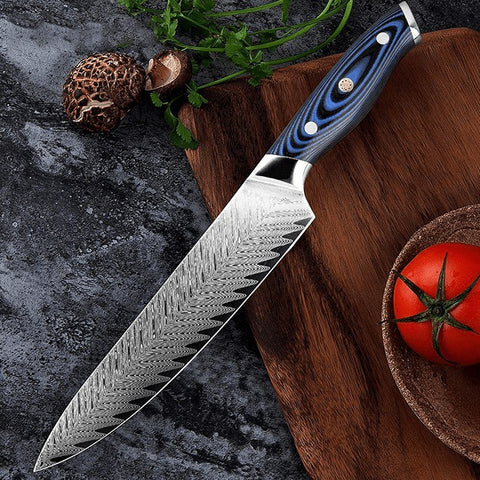X Ray Lead Suspender Skirt,0.35 Xray Lead Skirt,0.5 X-Ray Lead Suspender Apron,Radiation Proof Lead Skirt Longkou Kangxie Medical Instrument Co., Ltd , https://www.kangxiemedical.com
A good chef knows that having a Damascus knife in the kitchen is essential. These knives are among the best in the world, not only for their exceptional performance but also for their stunning visual appeal. They represent a perfect blend of ancient craftsmanship and modern innovation. This article will explore what makes Damascus knives unique, how to choose the right one, and tips for proper maintenance.

**What is Damascus Steel?**
Damascus steel is highly prized for its distinctive wavy patterns and remarkable strength. Originally developed in the Middle East, blacksmiths used a special technique of folding and forging layers of steel and iron to create blades that were stronger and sharper than any other at the time. This process involved repeatedly heating, folding, and hammering the metal to produce a blade that was both hard and flexible.
Today, Damascus steel is valued not only for its durability but also for its beauty. Modern knife makers replicate the intricate patterns and superior qualities of historical models, making these knives as functional as they are artistic. The swirling designs add an elegant touch, while the performance ensures precision and reliability in every cut.
**History of Damascus Steel**
The origins of Damascus steel date back to around 300 BC when skilled craftsmen discovered that by layering and forging different metals, they could create a material that was both strong and flexible. This led to the creation of weapons and tools that were far more durable than those available at the time.
- **Ancient Craftsmanship:** Involves heating, folding, and forging steel.
- **Modern Techniques:** Today’s knife makers use advanced methods to recreate the appearance and quality of traditional Damascus steel.
**Characteristics of Damascus Steel**
Several key features make Damascus steel an excellent choice for chef knives:
- **Hardness:** The repeated folding process results in a blade that resists chipping and breaking.
- **Sharpness:** Damascus knives hold their edge longer than most other types of blades, reducing the need for frequent sharpening.
- **Beauty:** Each blade has a unique pattern, making it a work of art as well as a tool.
**Types of Damascus Steel Chef Knives**
There are various types of Damascus steel knives designed for different culinary tasks:
- **Kiritsuke Japanese Knife:** Ideal for precise cuts, especially when working with vegetables.
- **Gyuto Japanese Knife:** A versatile all-purpose knife suitable for most cutting tasks, except for bones.
For example, the **Kiritsuke Japanese Knife Damascus Steel with Coloured Ebony Handle** is perfect for clean, accurate cuts, while the **Gyuto Japanese Damascus Steel Knife with Coloured Blue Handle** offers great versatility in the kitchen.
**Blade Length and Handle Design**
- **Blade Length:** Damascus knives typically range from 6 to 12 inches, so choose a length that feels comfortable and suits your needs.
- **Handle Design:** Look for handles that provide a secure grip and are easy on the hand during extended use, such as the **Kiritsuke Japanese Damascus Steel Chef Knife With Coloured Octagonal Handle**.
**Maintaining Your Damascus Steel Chef Knife**
Proper care is essential to ensure your knife lasts for years:
- **Cleaning and Storage:**
- **Hand Wash Only:** Always wash by hand using mild soap and warm water, then dry immediately.
- **Dry Thoroughly:** Make sure there is no moisture left on the blade or handle to prevent rust and corrosion.
- **Safekeeping Properly:** Store in a knife block or on a magnetic strip to protect the blade from damage.
- **Sharpening/Honing:**
- **Regular Honing:** Use a honing rod frequently to maintain the edge and extend the life of your knife.
**FAQs**
- **How often should I sharpen my Damascus steel chef's knife?**
For regular home cooks, sharpening every few months is usually sufficient. Professional chefs may need to do it more often.
- **Can I put my Damascus steel knife in the dishwasher?**
No, always hand-wash your Damascus steel knife to avoid damaging the blade and handle.
- **Are Damascus steel knives worth the investment?**
Yes, they offer excellent durability, sharpness, and aesthetics, making them a great investment for serious cooks.
- **Can I use a Damascus steel knife for all types of food?**
While versatile, it's best to use them for slicing and chopping to maintain their edge and longevity.
**Conclusion:**
A Damascus steel chef's knife is more than just a kitchen tool—it’s a masterpiece of craftsmanship and function. These knives combine strength, beauty, and precision, making them a valuable addition to any kitchen. By choosing the right blade and caring for it properly, you can enjoy the benefits of a Damascus knife for many years to come. Whether you're a professional chef or a passionate home cook, a Damascus knife is an investment that will pay off in both performance and style.